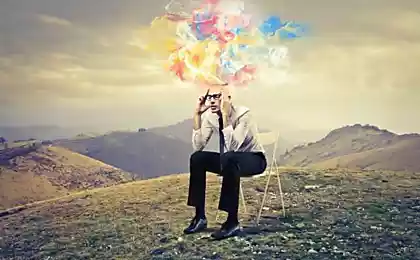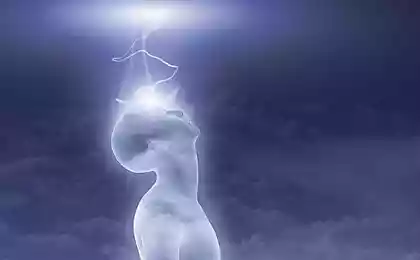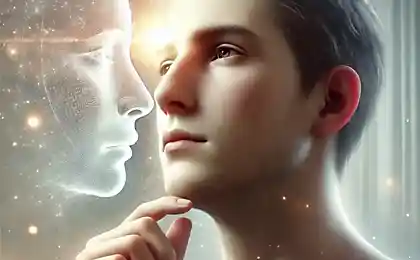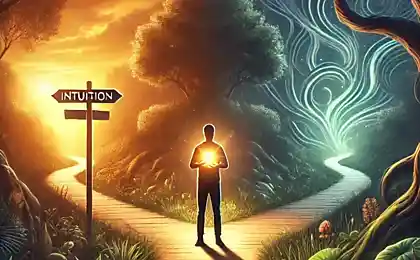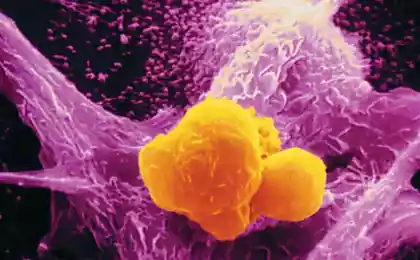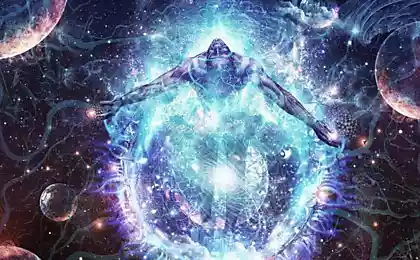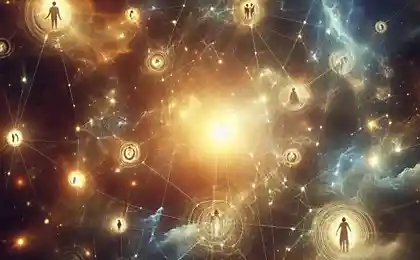692
Intuition — the interaction of conscious and unconscious
"You know it?""No, but I intuitively feel...»
Often the word "intuition" we use to refer to something indefinite, not supported by logic. However, the intuition of the ancient logical thinking, and millions of years people have relied on it exclusively. Its very survival largely depended on the degree of development of intuition.Today, intuition plays no lesser role.
Thirty seven million eight hundred thirty thousand seven hundred forty four
A big part of what carries the philosophy, art, science, or any discovery, happens on an intuitive level. To create a work of art (and later to understand its meaning) to get to any discovery or invention, to create something new, to understand the meaning of any idea and any law in Nature, you need not only knowledge, not only of the theory of philosophy, science or aesthetics. You need to feel and convey the SPIRIT, the ESSENCE, the POWER of the idea that we are trying to understand or pass through any form. And this spirit can not adequately articulate or explain words.
Intuition is the means by which our Heart and Soul to communicate with our Consciousness: it goes far beyond logic and common sense. Human intuition not only uses visual images, but symbols, metaphors, archetypes, she uses creative methods and forms accumulated over the entire history of human development. Therefore intuition in its capabilities incomparably richer than all the others, more ordinary and more familiar, forms of knowledge.
Logic is a limited tool of our Consciousness. It is a tool of thinking but not thinking itself. She processes information, but does not create new knowledge, she is responsible for the correctness of the conversion of propositions, but not able to figure out true or false those assumptions.
The paradox is that to think entirely logically, rationally — impossible. So the logic should be preceded by a kind of ability to know the truth. This ability to know the truth, and that predates logic, and for the recognition of truth does not use logic in ancient times was called intuition. (The word "intuition" comes from the Latin intuition, "closely scrutinizing".)
Where the mind makes a coherent, logical steps, steadily but slowly approaching the goal, the intuition works quickly and even lightning as a flash. She doesn't need proof, it's not based on reasoning. Intuitive thinking goes unnoticed, "natural", it is not so tedious as logical, implying effort of will.
A man to trust intuition, he loses the thread of reasoning, is immersed in the turmoil of internal States, vague feelings and hunches, images and symbols.
On the contrary, if a person works in good conscious, logical mode, it is deprived of access to their intuitive user experience.
Thanks to the intuition of the person immediately presents a picture of reality as a whole. He has a presentiment of, or even clearly see how further events unfold (at least the main options) and what is the event or drama, the essence of which is so poorly understood by its participants. But it will be much harder to convey, to put this picture into words (at least without significant loss), and in addition, to answer how he was able to understand what is happening (if not to consider the answer link to life experience).
According to the American psychotherapist Eric Berne, "intuition implies that we know about something, not knowing how we learned about it."
Psychologists do not imagine how intuition works, and even worse — how to study it. Most often use the term "insight" — insight: the word comes from the English insight, "comprehension", "insight", "insight". This term refers to the moment when the person suddenly have a new idea, come up with a solution to the problem on which he thought for a long time. Insight called the "Aha-reaction", meaning that shouting we involuntarily make, if you suddenly start to grasp the essence of the problem situation and see a way out of it. The creative inspiration of Archimedes jumped from the bath shouting "Eureka!"—a classic illustration of insight.
Therefore, many modern psychologists believe that the source of intuition and the Unconscious, more precisely, in his established interaction with consciousness. Studies confirm this conclusion. When intuition manifests itself, it works with feelings, archetypes, symbols. It is no coincidence that intuitive foresight is often born in a dream, half asleep or daydreaming.
People with a developed intuition is able to subtly perceive subconscious information, such as intonation, facial expressions, gestures, eyes are able to understand much of what his interlocutor is unwilling or unable to say openly. Almost all of this information does not fall into our field of attention and is not accessible to conscious control, but it does not disappear for us at all, forming the special level of the unconscious, intuitive experience. The visceral experience one gets in addition to the desire and the will, it cannot be arbitrarily shown or repeated, though significantly affects the nature of our activities and behavior. Intuitive experience determines the direction in which thinking occurs.
Philosophers, in particular Socrates and Plato, understood intuition and intuitive experience is much deeper.
They saw intuition as an integral person's ability to holistic, holographic knowledge of the truth at the same time in different aspects — Past, Present and Future, Life and Death, Evolution, Space and Time, of Eternity, of the Visible and Invisible, Archetype and Form, Spiritual and Material.
And intuitive experience in their understanding — is not only "external" moments that fall into the subconscient, not just abstract "Unconscious" of man, which they say modern psychologists. It is the ability of "recognition", "memories". We are talking about the experience of the Immortal Soul, which she has collected for a long series of incarnations. Part of this experience, the soul learns, remembers through a flash of intuition, "insight". It is the ability to capture ideas-archetypes, the ability to move beyond the material world, the world of ideas and live in it or them at least one brief moment. This integral quality is still not fully developed in man, but it can be awakened and developed.
In 1926, the American researcher Graham Wallace suggested which later became the famous scheme of the process of creative thinking. He designed it on the basis of samanaleya of outstanding scientists, mainly German physiologist, physicist, and mathematician Hermann von Helmholtz and the French mathematician Henri Poincare. Wallace in this process has allocated four stages.
The first stage is preparation. It includes gathering the necessary information about the problem, the deliberate search for its solutions and thinking.
Philosophical experience says the same thing in other words: the required period, when nothing happens, when you think you're doing attempts, but they lead to nothing. It's like banging your head against the wall.
The second stage — incubation.The bearing problem. The period of apparent stagnation. In fact, there is always a deep unconscious work on the task, and at the level of consciousness the person may about it not to think.
Philosophical approach: when planted, watered — do not pull to see what happens. Let Nature do its thing.
The third stage is enlightenment. Inspiration, discovery, insight. Comes always unexpected, instantly and like a spike. The decision at this moment is born in the form of a symbol, thought-image, which is difficult to describe with words.
Fourth stage — check. The image is clothed in words, thoughts are arranged in logical sequence, the discovery is scientifically justified.
Moment of insight (insight), the idea is the culmination of the intuitive creative process. And still he remains elusive, mysterious, almost mystical. He probably will always be shrouded in mystery. If the secret of enlightenment was able to solve it playable, great discoveries would have been committed according to the instructions on the order. Readily available would be the solution to any problems in life, and obtaining new knowledge about the world and comprehend the deep truths — all that is usually given to people at great cost.
Although psychologists and philosophers agree in the main: the path of insight (insight), in General known. Should be hard and concentrated work on a specific problem — to fully explore it, trying to get maximum information, again and again, thinking about it, passionately dreaming to find a solution, but at the same time, not to cling to this desire. Inner enlightenment is the result of a long unconscious work. Some time need to live with the idea (a problem), finding solutions, and, most likely, at one point, it will illuminate the consciousness like a lightning strike, and will bring the extraordinary power of the experience of understanding, clarity, take-off, breakthrough, happiness.
French mathematician Henri Poincare about the illumination:
"What will surprise you first of all is the appearance of inner illumination which is the result of the long unconscious work; the role of this unconscious work in mathematical invention seems to me indisputable.
Often, when working on a difficult question, the first time can not be anything good, and then comes the more or less long period of rest and then again go and do.
Within the first half hour it is once again not moving, and then suddenly need an idea comes to mind.
It could be said that the conscious work has been more fruitful, as they were interrupted, and the rest returned to the mind force and freshness. But it is more likely to assume that this vacation was filled with unconscious work and that the result of this work was suddenly... Sometimes... an Epiphany is to occur during a walk or travel that occurs during the conscious work, but independently from this work, which most plays a role as a mechanism for translating the results obtained during rest, but remaining unconscious, in a conscious form.
There is another remark about the conditions of this unconscious work: it is possible, or at least fruitful only when it is preceded by and followed by conscious work.... Sudden flash of inspiration only happen after several days of conscious effort, which seemed absolutely barren...
The need for a... period of conscious work, after the inspiration is even more clear. You need to use the results of this inspiration, to deduce from them the immediate consequences, to put in order the proof.
But it is especially necessary to check them... I have already talked about the sense of absolute certainty which accompanies the inspiration, usually it is not is erroneous, but should be wary of confidence that it is a rule without exception."
German physiologist, physicist and mathematician Hermann Helmholtz on the insight:"These happy inspirations often invade the mind so quiet that I did not immediately notice their importance, sometimes only an accident will point out later, when and under what circumstances they came: we had an idea in my head, and how she — I do not know myself. But in other cases, the idea dawns on us suddenly, without effort, like an inspiration. As far as I can judge from personal experience, it is never born in the tired brain and never behind a Desk.
Every time I had first turn in every way to my job in every way, so that all her curves and plexus lay firmly in the head and could be again passed by heart, without the aid of writing. Reaching this is usually impossible without lots of work. Then, when I did this fatigue, required a full hour of corporal freshness and well-intentioned peace — and only then came good ideas.
Often... they were in the morning, when awakening, as was noticed by Gauss. Especially happy they came... in the hours leisurely climbing the wooded mountains, on a Sunny day. The slightest amount of liquor as if to scare them away."
You need to awaken and develop intuition?
To raise the consciousness. Don't get stuck for too long in small, everyday issues and problems. Every day take time to elevate consciousness. Trim away unwanted thoughts, emotions, and wrap. To learn to "not think" at important moments. The intuition starts to work then stops when logical thinking. Logic is needed, but all the time. To remove the stereotypical approaches. Every time to rethink anew what I already know. In any action to make work. Not to remain in inaction. To show initiative and effort. When there is any question, do anything to find the answer yourself. The invention of the sewing machine in a dream
Inventor Elias Hove for a long time and worked tirelessly creating the first sewing machine, but nothing worked. One night he had a nightmare: he's being chased by a gang of cannibals, they had almost caught him — he even saw the glint of spearheads. Through all this horror suddenly Hove have noted that each tip of the drilled hole, reminiscent of eyelet sewing needle. And then he woke up, panting from fear.
Only later Hove guessed that he wanted to give night vision. To the sewing machine to work, just had to move the eye of a needle with her middle down to the tip. This was the same solution that he was looking for. So due to terrible sleep, visited Hove, was born on the sewing machine.
Disney and music
Walt Disney was a great lover of classical music. He claimed that at the first sound in his mind begin to arise picture. Animated film "Fantasia", where classical music brings to life a phantasmagoria of colors and shapes, was an attempt to share this experience: Disney firmly believed that in this way the music will cause people to have a greater response.
"In music there are moments that it's hard for people to understand until they see on the screen embodying its images, he said. Only then they will be able to experience the full depth of sound."
The ability to ask questions
Einstein once remarked that if he was going to kill and he had only one hour to come up with a plan of salvation, he would devote the first fifty-five minutes, the correct formulation of the question. "To find the answer, as Einstein said, — enough for five minutes."
The method of Leonardo da Vinci
From modern psychology it is known that almost any stimulus — even completely meaningless Rorschach blots — causes a stream of associations that instantly connects the most sensitive area of your consciousness. Leonardo da Vinci discovered it five centuries before Sigmund Freud. However, in contrast to Freud, Leonardo did not use free Association to identify any deep-seated complexes. On the contrary, so great Florentine during the Renaissance paved its own path to artistic and scientific insights.
"It's not hard... — wrote Leonardo in "Notes," just to stop by and look at the streaks on the wall, or the coals in the fire, or clouds, or mud... there you can find such amazing ideas...»
Leonardo drew inspiration also from the sounds of bells, "the bells which you can catch any name and any word you can imagine".
It is possible that practicing some of the techniques you can feel pretty stupid, but no need to worry. You're in good company. Leonardo da Vinci also recognized that his "new way" will surely amuse the cynics.
"It may seem ridiculous and absurd, he wrote. — But nevertheless very useful in order to inspire the mind to various inventions".
The benefits of diary
In 20-ies of our century researcher Catherine Cox studied in detail the biographies of over three hundred historical geniuses such as sir Isaac Newton, Thomas Jefferson, Johann Sebastian Bach. Her exhaustive study of the extant facts revealed astonishing similarities in the behavior and habits of these remarkable people.
According to Cox, one of the signs of genius is the tendency to eloquently describe your feelings and thoughts in a diary, poems, letters to friends and family. This trend begins to manifest at an early age. Cox observed this not only among writers but also among the military, politicians and scientists.
The confirmation of the words coke can be easily found by digging in the library. It is known that no more than one percent of humanity are wont to describe their thoughts and feelings in diaries, cherished notebooks or books. But what is interesting: have achieved outstanding success in life, generally fall into this one percent.
So what is true: every writer is a genius or just a genius writer? Why great minds begin to keep diaries? Maybe they anticipate his future glory and want to leave a legacy to historians? Or passion for writing is a by-product of a busy mind? Or an overly inflated ego? And maybe — and here I want to address is the mechanism by which people who are not born genius, unconsciously develop outstanding intelligence?
These thoughts come rarely
Once a reporter asked albert Einstein if he writes his great thoughts, and if anybody in the notebook or notebook or in a special file Cabinet. Einstein looked at the voluminous notebook of a reporter and said, "my Dear, these thoughts rarely come to mind that they are easy to remember!»
A physicist who does not know mathematics
English inventor Michael Faraday was one of the most outstanding scientific minds. His theory of electromagnetic fields and lines of force inspired Einstein. However, the method of Faraday puzzled and puzzled until now, those historians of science who possess the straightforwardness.
"Faraday... different mathematical absolute innocence... — surprised Isaac Asimov in the "History of physics". — He developed his theory of the power lines is surprisingly straightforward way, presenting them as rubber bands".
Scientists, apparently, did not know what to do with the lines of force of Faraday, if James Clark Maxwell subsequently described them mathematically. Poor Faraday tried very hard to understand the constructs of Maxwell, but in the end very confused and wrote to Maxwell's letter in which he begged him "to translate hieroglyphics into human language that I could understand."
To remain a child
One day a truck got stuck under an overpass because the body was too high. Police and road service tried to push it, but nothing happened. All suggestions of how to get a truck. First I decided to remove part of the cargo, but the truck felt better, sat up on the springs and more tightly stuck under a bridge. I tried to use a crowbar and wedges. Tried to increase the speed of the engine. In short, do everything that is usually done in such cases, but only became worse.
Suddenly came a six-year-old boy and offered to release some air from the tires. The problem was immediately solved!
Police and road workers were unable to free the truck because he knew too much, and all they knew about the release of the jammed machines were reduced, somehow, to the use of force. Most of our problems are exacerbated by our "megasnake". And only when we manage to escape from the known solutions, we begin to really grasp the essence of the problem.
Where Mozart took music?
Like many other geniuses, Wolfgang Amadeus Mozart claimed that he wrote his music in mind, bringing to perfection each chord before you take a pen and paper. Mozart often surprised his contemporaries, demonstrating the ability to "write" music interspersed with a game of Billiards, then casually and carelessly throwing the Overture to the Opera "don Giovanni" a few hours before its premiere. Mozart explained that in such cases he is not writing music, just like dictation, writes from the head of the ready passage.
In a letter dated 1789, a brilliant composer told me that, before capturing his creation on paper, he mentally looks at it as a whole, "as dazzlingly beautiful statue." Mozart did not lose their creations as they performed the orchestra — beat for beat — it covered all the "at a glance". "I don't listen to my imagination of the party successively, — he wrote — I can hear them sounding at the same time. I can't tell you what it's for pleasure!»
The opening of the benzene ring
After a day of work on a textbook of chemistry, Friedrich August von stradonitz felt disappointed. "It's bad, — chemist, — my soul is too preoccupied". Von stradonitz pulled the chair closer to the fireplace and stared into the dancing flames. For a long time he pondered the molecule of benzene, the structure of which continued to elude him. In the end, as he admitted subsequently, he fell into a drowsy state. What happened then, entered into scientific folklore as the greatest moment and greatest miracle.
Starting to doze off, von stradonitz was nodding off and suddenly saw a flame of some fantastic form. "I saw the atoms pass before my eyes,' recalled a scientist. They were moving in long rows, twisting like snakes".
Suddenly, he caught some sudden movement. "What is it? One of the snakes grabbed its own tail... and violently spun... I woke up from the flash of lightning."
Von stradonitz realized that the subconscious mind suggested to him the key to the shape of benzene molecules. The rest of the night he spent working on the task. Shortly after this event, in 1865, he announced that the gasoline molecule consists of six carbon atoms. The connection of atoms was amazingly similar to a snake from the dream.
Point of view
In one of his lectures David Hilbert said, "Every person has a certain horizon observation problem. When it narrows and becomes infinitely small, it turns into a point. Then the man says: "This is my point of view"".
Columbus egg
When solving any problem, you must first set the boundaries that must fit the decision. Once these boundaries are presumably installed, formulaic thinking sets to solving problems within these boundaries. Often, however, the boundaries are imaginary, and the solution is beyond them. Take, for example, the apocryphal story of the Columbus egg. In response to the jokes of friends, claimed that the discovery of America was, in fact, is not that a difficult task, because Columbus needed only one thing — to keep updated all the time to the West, he asked them to put the egg on the butt. Friends took over, but despite all their efforts, the egg invariably toppled over on its side. Then Columbus took the egg, slightly flattened at one end and set. Friends, of course, protested, believing that the egg can not be split, thus establishing the limits of the solution, which does not actually exist. But they also considered the recklessness of taking a course on the West, stick to it throughout the voyage. The innovation in the art of navigation became possible only after Columbus proved that the fears of his opponents were unfounded.
Genius is patience thoughts focused in one direction. ©I. Newton
If you do not sin against reason, it is just impossible for anything to come. © A. Einstein
Back to work — and the understanding will come later. ©Jean D'alembert
The desire to first understand all the way to the end and then to work — a very common cause failures.©A. B. Migdal
A true scientist is a dreamer and who he is not, he calls himself a practitioner.
© Balzac
My results I have long known, I just don't know how I will come to them. ©K. Gauss
There are four greatest obstacles to the attainment of truth, namely: an example of pitiful and unworthy authority, constancy of a habit, opinion of ignorant crowd and covering own ignorance and seeming wisdom. ©R. Bacon
Great opportunities come to all, but many do not even know that met them.©W. Channing published
Author: Elena Sikirich
P. S. And remember, only by changing their consumption — together we change the world! © econet
Source: www.newacropolis.ru/magazines/1_2004/Da_zdrav_intuitciya/
Often the word "intuition" we use to refer to something indefinite, not supported by logic. However, the intuition of the ancient logical thinking, and millions of years people have relied on it exclusively. Its very survival largely depended on the degree of development of intuition.Today, intuition plays no lesser role.
Thirty seven million eight hundred thirty thousand seven hundred forty four
A big part of what carries the philosophy, art, science, or any discovery, happens on an intuitive level. To create a work of art (and later to understand its meaning) to get to any discovery or invention, to create something new, to understand the meaning of any idea and any law in Nature, you need not only knowledge, not only of the theory of philosophy, science or aesthetics. You need to feel and convey the SPIRIT, the ESSENCE, the POWER of the idea that we are trying to understand or pass through any form. And this spirit can not adequately articulate or explain words.
Intuition is the means by which our Heart and Soul to communicate with our Consciousness: it goes far beyond logic and common sense. Human intuition not only uses visual images, but symbols, metaphors, archetypes, she uses creative methods and forms accumulated over the entire history of human development. Therefore intuition in its capabilities incomparably richer than all the others, more ordinary and more familiar, forms of knowledge.
Logic is a limited tool of our Consciousness. It is a tool of thinking but not thinking itself. She processes information, but does not create new knowledge, she is responsible for the correctness of the conversion of propositions, but not able to figure out true or false those assumptions.
The paradox is that to think entirely logically, rationally — impossible. So the logic should be preceded by a kind of ability to know the truth. This ability to know the truth, and that predates logic, and for the recognition of truth does not use logic in ancient times was called intuition. (The word "intuition" comes from the Latin intuition, "closely scrutinizing".)
Where the mind makes a coherent, logical steps, steadily but slowly approaching the goal, the intuition works quickly and even lightning as a flash. She doesn't need proof, it's not based on reasoning. Intuitive thinking goes unnoticed, "natural", it is not so tedious as logical, implying effort of will.
A man to trust intuition, he loses the thread of reasoning, is immersed in the turmoil of internal States, vague feelings and hunches, images and symbols.
On the contrary, if a person works in good conscious, logical mode, it is deprived of access to their intuitive user experience.
Thanks to the intuition of the person immediately presents a picture of reality as a whole. He has a presentiment of, or even clearly see how further events unfold (at least the main options) and what is the event or drama, the essence of which is so poorly understood by its participants. But it will be much harder to convey, to put this picture into words (at least without significant loss), and in addition, to answer how he was able to understand what is happening (if not to consider the answer link to life experience).
According to the American psychotherapist Eric Berne, "intuition implies that we know about something, not knowing how we learned about it."
Psychologists do not imagine how intuition works, and even worse — how to study it. Most often use the term "insight" — insight: the word comes from the English insight, "comprehension", "insight", "insight". This term refers to the moment when the person suddenly have a new idea, come up with a solution to the problem on which he thought for a long time. Insight called the "Aha-reaction", meaning that shouting we involuntarily make, if you suddenly start to grasp the essence of the problem situation and see a way out of it. The creative inspiration of Archimedes jumped from the bath shouting "Eureka!"—a classic illustration of insight.
Therefore, many modern psychologists believe that the source of intuition and the Unconscious, more precisely, in his established interaction with consciousness. Studies confirm this conclusion. When intuition manifests itself, it works with feelings, archetypes, symbols. It is no coincidence that intuitive foresight is often born in a dream, half asleep or daydreaming.
People with a developed intuition is able to subtly perceive subconscious information, such as intonation, facial expressions, gestures, eyes are able to understand much of what his interlocutor is unwilling or unable to say openly. Almost all of this information does not fall into our field of attention and is not accessible to conscious control, but it does not disappear for us at all, forming the special level of the unconscious, intuitive experience. The visceral experience one gets in addition to the desire and the will, it cannot be arbitrarily shown or repeated, though significantly affects the nature of our activities and behavior. Intuitive experience determines the direction in which thinking occurs.
Philosophers, in particular Socrates and Plato, understood intuition and intuitive experience is much deeper.
They saw intuition as an integral person's ability to holistic, holographic knowledge of the truth at the same time in different aspects — Past, Present and Future, Life and Death, Evolution, Space and Time, of Eternity, of the Visible and Invisible, Archetype and Form, Spiritual and Material.
And intuitive experience in their understanding — is not only "external" moments that fall into the subconscient, not just abstract "Unconscious" of man, which they say modern psychologists. It is the ability of "recognition", "memories". We are talking about the experience of the Immortal Soul, which she has collected for a long series of incarnations. Part of this experience, the soul learns, remembers through a flash of intuition, "insight". It is the ability to capture ideas-archetypes, the ability to move beyond the material world, the world of ideas and live in it or them at least one brief moment. This integral quality is still not fully developed in man, but it can be awakened and developed.
In 1926, the American researcher Graham Wallace suggested which later became the famous scheme of the process of creative thinking. He designed it on the basis of samanaleya of outstanding scientists, mainly German physiologist, physicist, and mathematician Hermann von Helmholtz and the French mathematician Henri Poincare. Wallace in this process has allocated four stages.
The first stage is preparation. It includes gathering the necessary information about the problem, the deliberate search for its solutions and thinking.
Philosophical experience says the same thing in other words: the required period, when nothing happens, when you think you're doing attempts, but they lead to nothing. It's like banging your head against the wall.
The second stage — incubation.The bearing problem. The period of apparent stagnation. In fact, there is always a deep unconscious work on the task, and at the level of consciousness the person may about it not to think.
Philosophical approach: when planted, watered — do not pull to see what happens. Let Nature do its thing.
The third stage is enlightenment. Inspiration, discovery, insight. Comes always unexpected, instantly and like a spike. The decision at this moment is born in the form of a symbol, thought-image, which is difficult to describe with words.
Fourth stage — check. The image is clothed in words, thoughts are arranged in logical sequence, the discovery is scientifically justified.
Moment of insight (insight), the idea is the culmination of the intuitive creative process. And still he remains elusive, mysterious, almost mystical. He probably will always be shrouded in mystery. If the secret of enlightenment was able to solve it playable, great discoveries would have been committed according to the instructions on the order. Readily available would be the solution to any problems in life, and obtaining new knowledge about the world and comprehend the deep truths — all that is usually given to people at great cost.
Although psychologists and philosophers agree in the main: the path of insight (insight), in General known. Should be hard and concentrated work on a specific problem — to fully explore it, trying to get maximum information, again and again, thinking about it, passionately dreaming to find a solution, but at the same time, not to cling to this desire. Inner enlightenment is the result of a long unconscious work. Some time need to live with the idea (a problem), finding solutions, and, most likely, at one point, it will illuminate the consciousness like a lightning strike, and will bring the extraordinary power of the experience of understanding, clarity, take-off, breakthrough, happiness.
French mathematician Henri Poincare about the illumination:
"What will surprise you first of all is the appearance of inner illumination which is the result of the long unconscious work; the role of this unconscious work in mathematical invention seems to me indisputable.
Often, when working on a difficult question, the first time can not be anything good, and then comes the more or less long period of rest and then again go and do.
Within the first half hour it is once again not moving, and then suddenly need an idea comes to mind.
It could be said that the conscious work has been more fruitful, as they were interrupted, and the rest returned to the mind force and freshness. But it is more likely to assume that this vacation was filled with unconscious work and that the result of this work was suddenly... Sometimes... an Epiphany is to occur during a walk or travel that occurs during the conscious work, but independently from this work, which most plays a role as a mechanism for translating the results obtained during rest, but remaining unconscious, in a conscious form.
There is another remark about the conditions of this unconscious work: it is possible, or at least fruitful only when it is preceded by and followed by conscious work.... Sudden flash of inspiration only happen after several days of conscious effort, which seemed absolutely barren...
The need for a... period of conscious work, after the inspiration is even more clear. You need to use the results of this inspiration, to deduce from them the immediate consequences, to put in order the proof.
But it is especially necessary to check them... I have already talked about the sense of absolute certainty which accompanies the inspiration, usually it is not is erroneous, but should be wary of confidence that it is a rule without exception."
German physiologist, physicist and mathematician Hermann Helmholtz on the insight:"These happy inspirations often invade the mind so quiet that I did not immediately notice their importance, sometimes only an accident will point out later, when and under what circumstances they came: we had an idea in my head, and how she — I do not know myself. But in other cases, the idea dawns on us suddenly, without effort, like an inspiration. As far as I can judge from personal experience, it is never born in the tired brain and never behind a Desk.
Every time I had first turn in every way to my job in every way, so that all her curves and plexus lay firmly in the head and could be again passed by heart, without the aid of writing. Reaching this is usually impossible without lots of work. Then, when I did this fatigue, required a full hour of corporal freshness and well-intentioned peace — and only then came good ideas.
Often... they were in the morning, when awakening, as was noticed by Gauss. Especially happy they came... in the hours leisurely climbing the wooded mountains, on a Sunny day. The slightest amount of liquor as if to scare them away."
You need to awaken and develop intuition?
To raise the consciousness. Don't get stuck for too long in small, everyday issues and problems. Every day take time to elevate consciousness. Trim away unwanted thoughts, emotions, and wrap. To learn to "not think" at important moments. The intuition starts to work then stops when logical thinking. Logic is needed, but all the time. To remove the stereotypical approaches. Every time to rethink anew what I already know. In any action to make work. Not to remain in inaction. To show initiative and effort. When there is any question, do anything to find the answer yourself. The invention of the sewing machine in a dream
Inventor Elias Hove for a long time and worked tirelessly creating the first sewing machine, but nothing worked. One night he had a nightmare: he's being chased by a gang of cannibals, they had almost caught him — he even saw the glint of spearheads. Through all this horror suddenly Hove have noted that each tip of the drilled hole, reminiscent of eyelet sewing needle. And then he woke up, panting from fear.
Only later Hove guessed that he wanted to give night vision. To the sewing machine to work, just had to move the eye of a needle with her middle down to the tip. This was the same solution that he was looking for. So due to terrible sleep, visited Hove, was born on the sewing machine.
Disney and music
Walt Disney was a great lover of classical music. He claimed that at the first sound in his mind begin to arise picture. Animated film "Fantasia", where classical music brings to life a phantasmagoria of colors and shapes, was an attempt to share this experience: Disney firmly believed that in this way the music will cause people to have a greater response.
"In music there are moments that it's hard for people to understand until they see on the screen embodying its images, he said. Only then they will be able to experience the full depth of sound."
The ability to ask questions
Einstein once remarked that if he was going to kill and he had only one hour to come up with a plan of salvation, he would devote the first fifty-five minutes, the correct formulation of the question. "To find the answer, as Einstein said, — enough for five minutes."
The method of Leonardo da Vinci
From modern psychology it is known that almost any stimulus — even completely meaningless Rorschach blots — causes a stream of associations that instantly connects the most sensitive area of your consciousness. Leonardo da Vinci discovered it five centuries before Sigmund Freud. However, in contrast to Freud, Leonardo did not use free Association to identify any deep-seated complexes. On the contrary, so great Florentine during the Renaissance paved its own path to artistic and scientific insights.
"It's not hard... — wrote Leonardo in "Notes," just to stop by and look at the streaks on the wall, or the coals in the fire, or clouds, or mud... there you can find such amazing ideas...»
Leonardo drew inspiration also from the sounds of bells, "the bells which you can catch any name and any word you can imagine".
It is possible that practicing some of the techniques you can feel pretty stupid, but no need to worry. You're in good company. Leonardo da Vinci also recognized that his "new way" will surely amuse the cynics.
"It may seem ridiculous and absurd, he wrote. — But nevertheless very useful in order to inspire the mind to various inventions".
The benefits of diary
In 20-ies of our century researcher Catherine Cox studied in detail the biographies of over three hundred historical geniuses such as sir Isaac Newton, Thomas Jefferson, Johann Sebastian Bach. Her exhaustive study of the extant facts revealed astonishing similarities in the behavior and habits of these remarkable people.
According to Cox, one of the signs of genius is the tendency to eloquently describe your feelings and thoughts in a diary, poems, letters to friends and family. This trend begins to manifest at an early age. Cox observed this not only among writers but also among the military, politicians and scientists.
The confirmation of the words coke can be easily found by digging in the library. It is known that no more than one percent of humanity are wont to describe their thoughts and feelings in diaries, cherished notebooks or books. But what is interesting: have achieved outstanding success in life, generally fall into this one percent.
So what is true: every writer is a genius or just a genius writer? Why great minds begin to keep diaries? Maybe they anticipate his future glory and want to leave a legacy to historians? Or passion for writing is a by-product of a busy mind? Or an overly inflated ego? And maybe — and here I want to address is the mechanism by which people who are not born genius, unconsciously develop outstanding intelligence?
These thoughts come rarely
Once a reporter asked albert Einstein if he writes his great thoughts, and if anybody in the notebook or notebook or in a special file Cabinet. Einstein looked at the voluminous notebook of a reporter and said, "my Dear, these thoughts rarely come to mind that they are easy to remember!»
A physicist who does not know mathematics
English inventor Michael Faraday was one of the most outstanding scientific minds. His theory of electromagnetic fields and lines of force inspired Einstein. However, the method of Faraday puzzled and puzzled until now, those historians of science who possess the straightforwardness.
"Faraday... different mathematical absolute innocence... — surprised Isaac Asimov in the "History of physics". — He developed his theory of the power lines is surprisingly straightforward way, presenting them as rubber bands".
Scientists, apparently, did not know what to do with the lines of force of Faraday, if James Clark Maxwell subsequently described them mathematically. Poor Faraday tried very hard to understand the constructs of Maxwell, but in the end very confused and wrote to Maxwell's letter in which he begged him "to translate hieroglyphics into human language that I could understand."
To remain a child
One day a truck got stuck under an overpass because the body was too high. Police and road service tried to push it, but nothing happened. All suggestions of how to get a truck. First I decided to remove part of the cargo, but the truck felt better, sat up on the springs and more tightly stuck under a bridge. I tried to use a crowbar and wedges. Tried to increase the speed of the engine. In short, do everything that is usually done in such cases, but only became worse.
Suddenly came a six-year-old boy and offered to release some air from the tires. The problem was immediately solved!
Police and road workers were unable to free the truck because he knew too much, and all they knew about the release of the jammed machines were reduced, somehow, to the use of force. Most of our problems are exacerbated by our "megasnake". And only when we manage to escape from the known solutions, we begin to really grasp the essence of the problem.
Where Mozart took music?
Like many other geniuses, Wolfgang Amadeus Mozart claimed that he wrote his music in mind, bringing to perfection each chord before you take a pen and paper. Mozart often surprised his contemporaries, demonstrating the ability to "write" music interspersed with a game of Billiards, then casually and carelessly throwing the Overture to the Opera "don Giovanni" a few hours before its premiere. Mozart explained that in such cases he is not writing music, just like dictation, writes from the head of the ready passage.
In a letter dated 1789, a brilliant composer told me that, before capturing his creation on paper, he mentally looks at it as a whole, "as dazzlingly beautiful statue." Mozart did not lose their creations as they performed the orchestra — beat for beat — it covered all the "at a glance". "I don't listen to my imagination of the party successively, — he wrote — I can hear them sounding at the same time. I can't tell you what it's for pleasure!»
The opening of the benzene ring
After a day of work on a textbook of chemistry, Friedrich August von stradonitz felt disappointed. "It's bad, — chemist, — my soul is too preoccupied". Von stradonitz pulled the chair closer to the fireplace and stared into the dancing flames. For a long time he pondered the molecule of benzene, the structure of which continued to elude him. In the end, as he admitted subsequently, he fell into a drowsy state. What happened then, entered into scientific folklore as the greatest moment and greatest miracle.
Starting to doze off, von stradonitz was nodding off and suddenly saw a flame of some fantastic form. "I saw the atoms pass before my eyes,' recalled a scientist. They were moving in long rows, twisting like snakes".
Suddenly, he caught some sudden movement. "What is it? One of the snakes grabbed its own tail... and violently spun... I woke up from the flash of lightning."
Von stradonitz realized that the subconscious mind suggested to him the key to the shape of benzene molecules. The rest of the night he spent working on the task. Shortly after this event, in 1865, he announced that the gasoline molecule consists of six carbon atoms. The connection of atoms was amazingly similar to a snake from the dream.
Point of view
In one of his lectures David Hilbert said, "Every person has a certain horizon observation problem. When it narrows and becomes infinitely small, it turns into a point. Then the man says: "This is my point of view"".
Columbus egg
When solving any problem, you must first set the boundaries that must fit the decision. Once these boundaries are presumably installed, formulaic thinking sets to solving problems within these boundaries. Often, however, the boundaries are imaginary, and the solution is beyond them. Take, for example, the apocryphal story of the Columbus egg. In response to the jokes of friends, claimed that the discovery of America was, in fact, is not that a difficult task, because Columbus needed only one thing — to keep updated all the time to the West, he asked them to put the egg on the butt. Friends took over, but despite all their efforts, the egg invariably toppled over on its side. Then Columbus took the egg, slightly flattened at one end and set. Friends, of course, protested, believing that the egg can not be split, thus establishing the limits of the solution, which does not actually exist. But they also considered the recklessness of taking a course on the West, stick to it throughout the voyage. The innovation in the art of navigation became possible only after Columbus proved that the fears of his opponents were unfounded.
Genius is patience thoughts focused in one direction. ©I. Newton
If you do not sin against reason, it is just impossible for anything to come. © A. Einstein
Back to work — and the understanding will come later. ©Jean D'alembert
The desire to first understand all the way to the end and then to work — a very common cause failures.©A. B. Migdal
A true scientist is a dreamer and who he is not, he calls himself a practitioner.
© Balzac
My results I have long known, I just don't know how I will come to them. ©K. Gauss
There are four greatest obstacles to the attainment of truth, namely: an example of pitiful and unworthy authority, constancy of a habit, opinion of ignorant crowd and covering own ignorance and seeming wisdom. ©R. Bacon
Great opportunities come to all, but many do not even know that met them.©W. Channing published
Author: Elena Sikirich
P. S. And remember, only by changing their consumption — together we change the world! © econet
Source: www.newacropolis.ru/magazines/1_2004/Da_zdrav_intuitciya/







